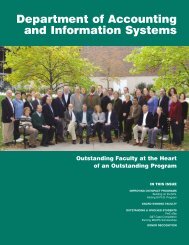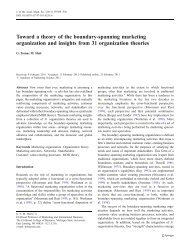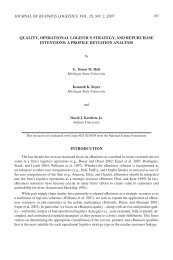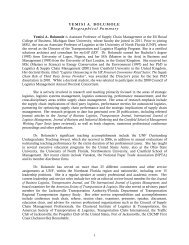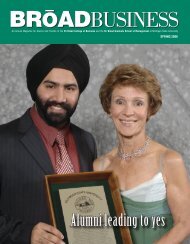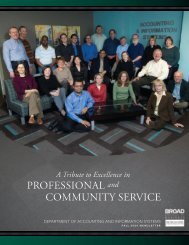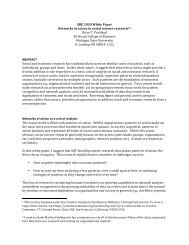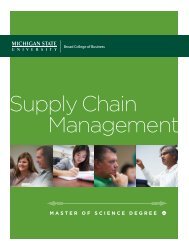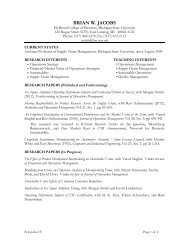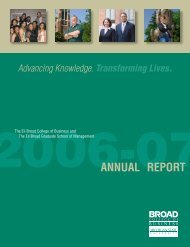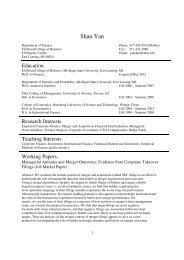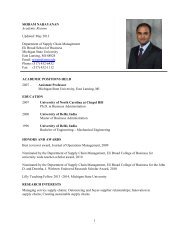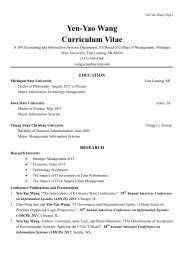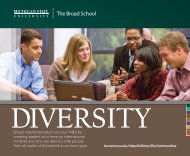Unpacking the Study Abroad Experience Workshop and Discussion
Unpacking the Study Abroad Experience Workshop and Discussion
Unpacking the Study Abroad Experience Workshop and Discussion
You also want an ePaper? Increase the reach of your titles
YUMPU automatically turns print PDFs into web optimized ePapers that Google loves.
<strong>Study</strong> <strong>Abroad</strong> &<br />
Career Competencies:<br />
Conveying <strong>the</strong> value to employers<br />
Philip Gardner, Ph.D<br />
Linda Gross, Ph.D<br />
Inge Steglitz, Ph.D<br />
June 2010<br />
CIBER<br />
Short Term <strong>Study</strong> <strong>Abroad</strong><br />
Conference<br />
Kansas City, MO
Objectives:<br />
• Gain insight into a mutually<br />
beneficial collaboration between<br />
study abroad <strong>and</strong> career services<br />
• Realize some of <strong>the</strong> dynamics of<br />
student reflection in<br />
underst<strong>and</strong>ing <strong>the</strong>ir learning <strong>and</strong><br />
building a portfolio of transferable<br />
skills<br />
• Contextualize <strong>the</strong> dem<strong>and</strong> for<br />
student reflection in light of <strong>the</strong><br />
learning imperatives for <strong>the</strong><br />
knowledge based economy
Outline for today’s sesson<br />
• A little context: purpose & history of our collaboration<br />
• Underlying research: what employers say<br />
• A little <strong>the</strong>ory: grounding our work<br />
• Student unpacking demonstrations: what really happens<br />
• Outlook: careers academic <strong>and</strong> professional<br />
• Questions <strong>and</strong> conversation
A bit of background<br />
• How it began<br />
• Current workshop focus<br />
• UT & MSU CIBER web resource<br />
collaboration<br />
• Future applications<br />
– International education/orientation<br />
– Assist advisers in focusing on <strong>the</strong><br />
total student
A synergy of mission<br />
between<br />
study abroad & career services<br />
A high quality program must take<br />
seriously <strong>the</strong> responsibility of<br />
helping students to make <strong>the</strong><br />
connection between <strong>the</strong>ir<br />
experiences <strong>and</strong> <strong>the</strong>ir future<br />
academic <strong>and</strong> professional careers.
SKILLS: THE BOTTOM LINE
A Model for Professional Expertise<br />
Organizational savvy<br />
Networking<br />
Self-management<br />
Taking Initiative<br />
Technical Competence<br />
Cognitive Abilities<br />
Teamwork<br />
effectiveness<br />
Leadership<br />
Followership<br />
Perspective<br />
Show:Tell<br />
Kelley, R. & Caplan.J. (1993). How Bell Labs Creates Star Performers. Harvard Business Review: July 1993
careernetwork.msu.edu/pdf/Competencies.pdf<br />
The 12 Essentials<br />
• Developing<br />
professional<br />
competencies<br />
• Communicating<br />
effectively<br />
• Solving problems<br />
• Balancing work <strong>and</strong><br />
life<br />
• Embracing change<br />
• Working effectively in<br />
a team<br />
• Working in a diverse<br />
environment<br />
• Managing time <strong>and</strong><br />
priorities<br />
• Navigating across<br />
boundaries<br />
• Acquiring knowledge<br />
• Thinking critically<br />
• Performing with<br />
integrity
Skill Usage: The Funnel<br />
1 st Job<br />
11-18 months<br />
Demonstrating Initiative<br />
Think Analytically<br />
Oral Communication<br />
Acquire & Apply Learning<br />
Apply Learning<br />
Writing Effectively<br />
Teamwork<br />
Grasp Realities of Workplace<br />
Acquire Learning<br />
Demonstrating Initiative<br />
2 nd job<br />
Evaluate Alternatives<br />
Creative Solutions<br />
Teamwork<br />
Leadership<br />
Utilize technology<br />
Grasp Realities of Workplace
Competencies: They are moving!<br />
• Build working, professional relationships<br />
• Analyze, evaluate <strong>and</strong> interpret data<br />
• Engage in continuous learning<br />
• Communicate through justification <strong>and</strong><br />
persuasion<br />
• Plan <strong>and</strong> manage a project<br />
• Create new knowledge<br />
• Seek global underst<strong>and</strong>ing
Leader of <strong>the</strong> Pack<br />
• Does Industrial Sector make a<br />
difference<br />
• Does Size make a difference<br />
• Does Geographic Location make a<br />
difference<br />
• Does Academic Major make a<br />
difference
STAR<br />
PERFORMER<br />
From Day 1<br />
EVERYBODY!<br />
NO EXCEPTIONS!
What skills do employers value from<br />
employees who have studied or interned<br />
abroad<br />
Skill Group #1<br />
45% + employer response range<br />
Skill Group #2<br />
All clustered in 30% employer response range<br />
• Interacting w/ people who hold different<br />
interests, values, perspectives (60%)<br />
• Underst<strong>and</strong>ing cultural differences in <strong>the</strong><br />
workplace (53% )<br />
• Adapting to situations of change (50%)<br />
• Gaining new knowledge from<br />
experiences (45%)<br />
• Ability to work independently<br />
• Undertaking tasks that are unfamiliar<br />
• Applying information in new or broader<br />
contexts<br />
• Identifying new problems/alternatives<br />
solutions<br />
• Working effectively with<br />
co-workers<br />
Gardner, Gross, & Steglitz (2008) <strong>Unpacking</strong> Your <strong>Study</strong> <strong>Abroad</strong> <strong>Experience</strong>: Critical Reflection for Workplace<br />
Competencies. CERI Research Brief 1-2008. Collegiate Employment Research Institute. East Lansing, MI:<br />
Michigan State University
The internship or co-op has become a high stakes event as it is<br />
<strong>the</strong> starting job of today.<br />
A NEW PLACE TO START
The Evidence<br />
Competency<br />
Eng FT<br />
5 yrs ago<br />
Eng Intern<br />
Today<br />
NonengFT<br />
5 yrs ago<br />
NonengInt<br />
Today<br />
Analyze 31% 30% 30% 22%<br />
Communicat. 35% 26% 34% 34%<br />
Teamwork 30% 33% 36% 31%<br />
Customer Ser. 27% 11% 28% 15%<br />
Global 11% 12% 13% 11%<br />
Innovation 7% 10% 9% 6%<br />
Diversity 9% 6% 11% 4%<br />
Plan 39% 34% 37% 31%<br />
Project 45% 46% 27% 38%
Employer Expectations:<br />
“Not What They Used To Be!”<br />
Yesterday’s Outcomes<br />
are<br />
Today’s Intern<br />
Expectations
The “New Starting Job”<br />
• Internships<br />
• Co-ops<br />
• Career-related employment<br />
• O<strong>the</strong>r engagement: no longer equal<br />
– Preparatory experiences
High Stakes Event<br />
• Knowing what your interests are<br />
• Frequency<br />
– How do you gain practice<br />
• Feedback<br />
– Reflection on practice<br />
– Reflection in practice<br />
– Time<br />
• Difficulty
The New Professional<br />
Smart University<br />
Preparing <strong>the</strong> new professional<br />
REQUIRES A WHOLE NEW<br />
LOOK ON CAMPUS
T-Shaped Professionals<br />
(Both Deep <strong>and</strong> Broad)<br />
Boundary Crossing Competencies<br />
communication,<br />
networks, critical thinking,<br />
global underst<strong>and</strong>ing,<br />
Many disciplines<br />
(underst<strong>and</strong>ing & communications)<br />
M<br />
E<br />
teamwork, perspective,<br />
organizational culture,<br />
project management, etc<br />
Many systems<br />
(underst<strong>and</strong>ing & communications)<br />
Deep in at least one discipline<br />
(analytic thinking & problem solving)<br />
Deep in at least one system<br />
(analytic thinking & problem solving)<br />
Jim Spohrer,<br />
IBM Labs
Extracting skills &<br />
competencies<br />
Provoking critical connections
If learning dem<strong>and</strong>s context, what kind of<br />
context do <strong>the</strong>se student comments suggest<br />
What do I need {insert dept & course #} for<br />
I just want to get my electives out of <strong>the</strong> way.<br />
If I take 20 credits each semester I can be done in 3<br />
years.<br />
But I completed all of <strong>the</strong> assignments, I should get at<br />
least a 3.0.<br />
Learning abroad will look really good on my resume.
Activities<br />
Student compartmentalization<br />
Academics<br />
Internships<br />
Service<br />
<strong>Study</strong> <strong>Abroad</strong><br />
Social life<br />
Work<br />
Finances<br />
Daily living stuff<br />
Family
Imperative to ask<br />
contextually<br />
meaningful questions<br />
• Stimulates critical thinking<br />
• Advances integration of student learning<br />
– Helps <strong>the</strong>m connect <strong>the</strong> dots!<br />
• Builds toward discovery <strong>and</strong> advancing<br />
knowledge essential for <strong>the</strong> emerging<br />
economic paradigm
Reflective Learning Model<br />
LEARNING CATALYST<br />
REFLECTION<br />
INTEGRATION<br />
Academic courses<br />
Life in residence<br />
Volunteer & Service-learning<br />
Internships, co-ops, practica<br />
<strong>Study</strong> <strong>Abroad</strong><br />
Organizational <strong>and</strong> leadership experiences<br />
O<strong>the</strong>r life events<br />
Learning<br />
Self awareness<br />
Critical thinking<br />
Skill identification<br />
Planning<br />
Decision-making<br />
Transition awareness<br />
Skill development<br />
Problem solving<br />
Ability to contribute<br />
Gross, L. (2002) Michigan State University
“The questions we ask<br />
determine where our<br />
thinking goes.”<br />
~Michael Scriven<br />
<strong>and</strong> Richard Paul
Think back for a<br />
moment.<br />
What was your most<br />
significant<br />
professional<br />
learning experience<br />
during <strong>the</strong> last year
The Power of Perspective
A case example<br />
in<br />
identifying<br />
transferable skills<br />
through reflection
The P-A-R-K Method<br />
Problem or need<br />
Action(s) you took<br />
Result(s) you achieved<br />
Knowledge or skills gained
But what do I know about<br />
career development<br />
• No matter what our role,<br />
each of us can help foster<br />
students’ career<br />
development<br />
• All we need is to ask <strong>the</strong><br />
right questions.
Exercise:<br />
Choose one of <strong>the</strong><br />
job bullet points<br />
<strong>and</strong> provide an<br />
example from your<br />
professional<br />
experience that<br />
demonstrates<br />
competency in that<br />
area.
“It is not <strong>the</strong> answer that enlightens, but<br />
<strong>the</strong> question.”<br />
~Eugène Ionesco
Tips for Practitioners<br />
• Establish a context for student reflection<br />
relative to <strong>the</strong>ir future life plans (i.e.<br />
employment field, graduate school).<br />
• Ask questions that provoke students to<br />
make connections. Why How<br />
• Use a novice approach. Ask questions to<br />
build your underst<strong>and</strong>ing or technical<br />
competence in <strong>the</strong> field<br />
• Push <strong>the</strong> envelope. Students make<br />
important realizations <strong>and</strong> associations when<br />
<strong>the</strong>y stretch <strong>the</strong>ir limits.
Conversation<br />
Outlook & Applications
“The quality of our<br />
thinking is given<br />
in <strong>the</strong> quality of<br />
our questions.”<br />
~Linda Elder <strong>and</strong> Richard Paul
Dr. Phil Gardner<br />
Collegiate Employment Research Institute<br />
gardnerp@msu.edu<br />
Dr. Linda Gross<br />
Career Services Network<br />
Office of <strong>the</strong> Associate Provost for Undergraduate Education<br />
grossL@msu.edu<br />
Dr. Inge Steglitz<br />
Office of <strong>Study</strong> <strong>Abroad</strong><br />
steglitz@msu.edu<br />
Advancing Knowledge.<br />
Transforming Lives.
References<br />
Linda Elder <strong>and</strong> Richard Paul (2002). The Art of Asking Essential Questions.<br />
Foundation for Critical Thinking (www.criticalthinking.org).<br />
Richard W. Paul (1995). Making Critical Thinking Intuitive. Foundation for<br />
Critical Thinking.<br />
Richard Paul <strong>and</strong> Linda Elder (2003). How to Improve Student Learning. 30<br />
Practical Ideas. 2 nd edition, Foundation for Critical Thinking<br />
(www.criticalthinking.org).<br />
Richard Paul <strong>and</strong> Linda Elder (2004). The Nature <strong>and</strong> Functions of Critical <strong>and</strong><br />
Creative Thinking. Foundationa for Critical Thinking (www.criticalthinking.org).<br />
Yelena Yershova, Joan DeJaeghere, <strong>and</strong> Josef Mestenhauser (2000).<br />
Thinking not as usual: Adding <strong>the</strong> intercultural perspective. In Journal of<br />
Studies in International Education, Vo. 4, No. 1, Spring 2000.



